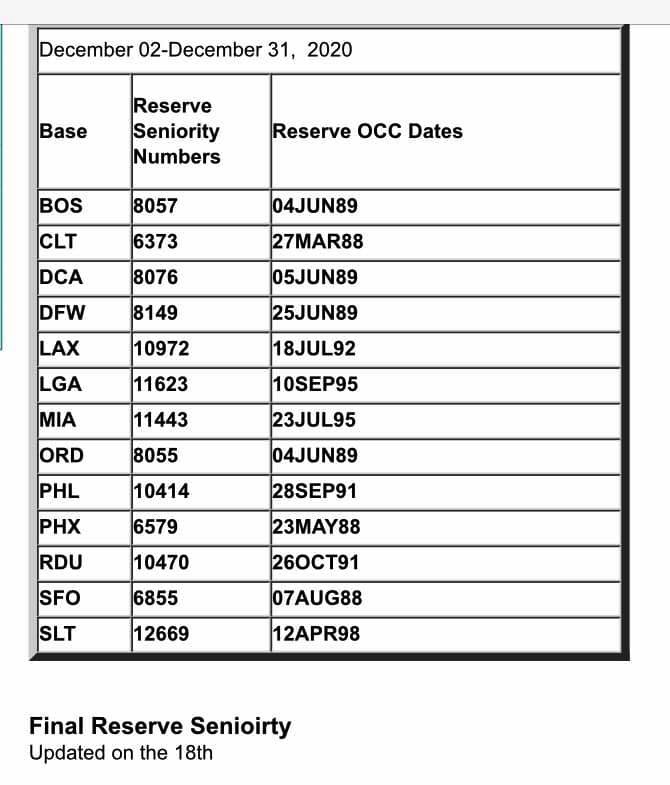Between American Airlines and United Airlines they’re furloughed 35,000 workers. Delta managed to avoid furloughs entirely, but Southwest Airlines only promised not to furlough workers through the end of the year. Southwest is now negotiating with unions on 10% pay reductions that would avoid letting anyone go. The airline says that would cover half the cost of having too many employees, and they’d cover the other half to be ready to grow as demand returns.
The problem with negotiating with a union on pay reductions for everyone to save the jobs of fewer than half of members is that a majority of a union’s members may not want to give up anything when they don’t have anything at risk. If furloughs go through the workers who remain still make full pay. Unions talk about solidarity but when it comes down to it it’s every worker for themselves.
That’s a short-sighted view though because furloughs don’t just disrupt the lives of those who lose their jobs. They’re just the most obvious people affected.
Pilots get bumped down to flying smaller aircraft, and from captain to co-pilot. Flight attendants though are really displaced too. That’s because senior flight attendants, used to working the best trips, wind up back on reserve.
- Reserve means there are specific days and times you’re scheduled to be ‘on call’ for the month. You can get a call and have to acknowledge it right away, head straight to the airport. You have to be available at all of your scheduled times, maybe starting at 4 a.m. You may sit at home, be out and about, and have to head into the airport to travel – or not. (You may also be told ahead of time that on some of your reserve days you’ll actually travel.)
- Ready reserve means you sit around at the airport in case you’re needed on the spot.
You may wind up traveling to different cities as a complete surprise. you don’t know where you’ll be sleeping on a given night. Or you may wake up in the middle of the night and wait, only to do nothing.
After furloughing about 8000 flight attendants there are American Airlines cabin crew that have been with the airline for over 30 years back on reserve. Here’s American’s seniority breakdown by flight attendant base for December assigned to reserve.

American flight attendants have complained about trips with 72 hour layovers in countries where they can’t leave their hotel rooms. The airline’s Senior Vice President Jill Surdek warned cabin crew they wouldn’t like the schedules they flew if they didn’t take voluntary early outs. But most people didn’t really internalize what that meant.
Southwest’s employees should consider that as they evaluate whether it’s worth some concessions to avoid furloughs to start 2021.


American flight attendants complain about everything. At least they have a job and income. Think of all the working stiffs out there who have been laid off since Feb/Mar with no idea of when they are going to get to return to work. Problem with airline personnel is they think they should never have any inconvenience in their life.
I would think a bigger consideration is which state the employee lives in.
Unemployment compensation varies a lot by state. An (ethical) fully funded state like MA has double the unemployment compensation vs a dump of a state like like FL,AZ,NC and SC. If you are furloughed in one of these states you are on a breadline. In other states it’s not so bad compared to the minimum wage hourly earnings on standby.
Well put OneXMarine!! Classic example of “telling it like is.” Hundreds of thousand with no job/income while the airlines and employees were still getting their normal salaries.. Perhaps it is time for them to finally wake up and realize there is nothing that separates them from the millions and millions of hard working Americans who got stiffed on this “bailout!!
I wanted to ask, and how much is executive managment taking in pay cuts in order to employ everybody?
My heart bleeds purple jelly for them. I think we owe it to them to throw another $25B bailout their way.
The jelly just stained my t-shirt. I’m submitting a bill.
Good, I’m glad to hear flight attendants and others. Especially american airlines. I hope american goes out of business and they realize by cheating customers out of fares for cancelled flights. We as customers need money as well for day to day living expenses. AGAIN, I HOPE AMERICAN AIRLINES GO OUT OF BUSINESS. It’s a shame, the government gave them money. Shame on you american airlines
@OlderWoman – Gary Kelly is taking a 100% salary cut for 2021 (board members also see their compensation cut). Leadership and non-union employees all take a 10% cut.
What base is SLT?
Hey Gary- Thanks! Very informative. Do you have the same seniority breakdown for United? Curious how deep their FA furloughs went back.
I think it’s a typo for SLT. The former TWA base of St Louis (STL) still has a lot of crew commuting from there.
As for the furloughed FAs, they won’t get their jobs back at their old seniority/tenure. I’m fairly certain they will be hired at a lower rate. My heart goes out to them.
I found the article confusing. Furloughing in and of itself would not seem to bump an employee down to a lower class. Isn’t it in “combination” with the reduction in the number of flights?
If the employee is union, it would seem that all those at the lowest rung would be the first to be furloughed. So isn’t it only because flight schedules are drastically cut that results in employees being downgraded to different service classes?